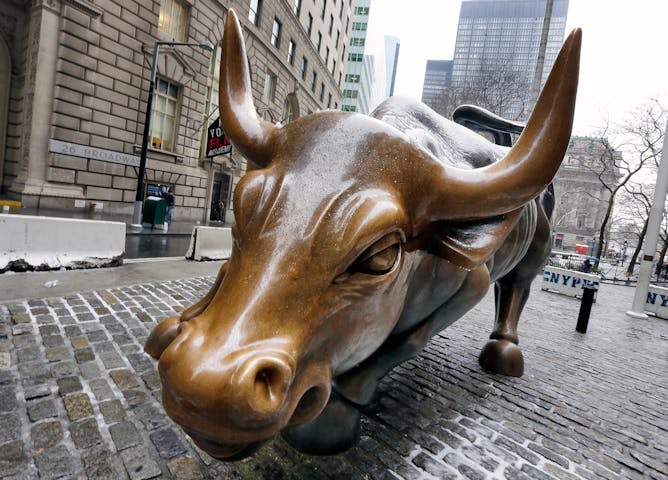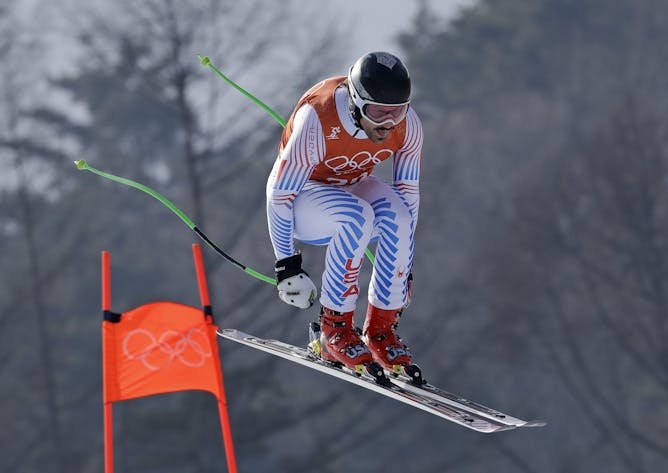| |
|
|
|
|
|
|
| |
|
Editor's note
|
|
Global stock markets have lost almost $5 trillion in value since an increase in wages spooked investors in late January. Higher wages are normally good news, but the fear now is that inflation is poised to accelerate. Richard S. Warr, a professor of finance at North Carolina State University, spells out how something as banal as a potential increase in prices of everyday goods and services can send stock investors into a tizzy.
This year’s flu season has wreaked havoc across the country, filling emergency rooms and hospitals. But have you ever stopped to wonder just how the influenza virus makes you so sick? As University of Connecticut immunologist Laura Haynes explains, when molecules that fight the flu leave our lungs, a cascade of complicating biological events occur.
It’s Day Three of the Winter Olympics and it’s not just the athletes who are competing for excellence. Engineers have designed skis and snowboards to customize performance for specific sports events, snow conditions and even specific riders. Marc Zupan, a materials scientist at the University of Maryland, Baltimore County, describes how wood, metals, epoxies and artificial compounds are combined into strong, flexible and lightweight composites.
|
Bryan Keogh
Economics + Business Editor
|

|
|
Top stories
|

Inflation may be a bull market’s greatest enemy.
AP Photo/Richard Drew
Richard S. Warr, North Carolina State University
While many market observers blame the growing threat of inflation for the stock market crash, the real culprit may be concerns that the economy is about to slow.
|

A flu patient at ProMedica Toledo Hospital in Toledo, Ohio on Jan. 8, 2018.
AP Photo/Tony Dejak
Laura Haynes, University of Connecticut
Anyone who's had the flu can attest that it makes them feel horrible. But why? What is going on inside the body that brings such pain and malaise? An immunologist explains.
|

What’s inside Olympians’ skis?
AP Photo/Luca Bruno
Marc Zupan, University of Maryland, Baltimore County
Highly engineered composite materials let skis ride smoothly, carve neatly and turn quickly – for top athletes and regular consumers alike.
|
Politics + Society
|
-
Linda J. Bilmes, Harvard University
Congress may have averted a shutdown, but don't get too excited, warns a Harvard budget expert. The deal isn't sustainable long term.
-
Geneviève Zubrzycki, University of Michigan
Seventy years after the end of World War II, a battle is taking place over Polish collective memory.
-
Robert Muggah, Pontifical Catholic University of Rio de Janeiro (PUC-Rio)
Since 2000, 8.8 million Brazilians have been displaced by disaster, development and crime, new data shows. Now Venezuelan migrants are pouring into the country. Still, Brazil has no real refugee plan.
|
|
Economy + Business
|
-
Paul Battaglio, University of Texas at Dallas; Doug Goodman, University of Texas at Dallas; Meghna Sabharwal, University of Texas at Dallas
Mission-driven workplaces, it so happens, can be pretty bad at rooting out leaders who are sexual abusers.
|
|
Arts + Culture
|
-
Duncan Stone, University of Huddersfield
In sports, what's considered fair play has changed throughout history. At one point, even looking 'too poor' was grounds for exclusion.
-
Soo Kang, Colorado State University
The mountainous Gangwon province, home of the 2018 Olympics, boasts some unique fare. A Korean professor describes her favorite dishes, from Korean surf and turf to tofu as soft as ice cream.
|
|
|
|
|
|
Trending on site
|
-
Gil B. Manzon Jr., Boston College
Income inequality, the most common way to measure the gap between the rich and the poor, only tells part of the story. Wealth inequality tells the rest.
-
Jay Maddock, Texas A&M University
Year after year, southern states consistently rank among the worst in the US for health and wellness.
-
Guevara Noubir, Northeastern University
It's not just fitness trackers – mobile phones can reveal users' whereabouts too, even with location tracking turned off.
|
|
|
|
| |
| |
|
|
|
|
|
|
|
|